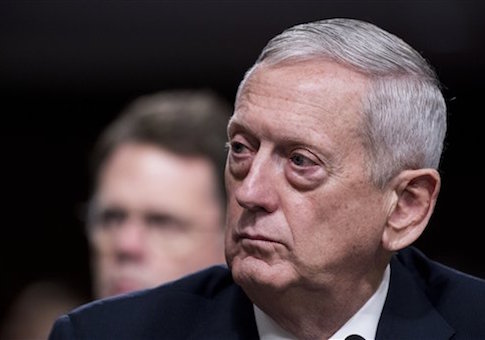Defense Secretary James Mattis will visit the Asia-Pacific region next week, amid warnings from Chinese officials over the Trump administration's comments about the South China Sea and rumblings from North Korea about test-firing an intercontinental ballistic missile.
Mattis will meet with his counterparts from Japan and South Korea during his first trip as defense secretary next week, the Pentagon said Wednesday, in order to underscore the U.S. commitment to its "enduring alliances" with both nations.
Mattis' trip will come in the wake of frosty reactions from Beijing over the Trump administration's commitment to protecting American interests in international waters of the South China Sea. China claims sovereignty over most of the body of water, ignoring the July ruling by an international tribunal in The Hague that its territorial claims in the South China Sea have no historical or legal basis.
Beijing has conducted dredging on disputed features and has also deployed weapons to its manmade islands in the region, casting aside warnings from U.S. officials against militarizing the South China Sea.
"I think the U.S. is going to make sure that we protect our interests there," White House spokesman Sean Spicer said during a Monday briefing when questioned about islands in the South China Sea. "So it's a question of if those islands are in fact in international waters and are not part of China proper then, yeah, we're going to make sure we defend international territories from being taken over by one country."
Officials from China's foreign ministry shot back on Tuesday, warning the United States not to get involved in the South China Sea dispute.
"We urge the United States to respect the facts, speak and act cautiously to avoid harming the peace and stability of the South China Sea," ministry spokeswoman Hua Chunying told reporters. "Our actions in the South China Sea are reasonable and fair. No matter what changes happen in other countries, what they say or what they want to do, China's resolve to protect its sovereignty and maritime rights in the South China Sea will not change."
Tensions between China and Japan have also heightened over Beijing's behavior in the East China Sea, where Chinese ships have made incursions surrounding the disputed Senkaku Islands claimed by both nations.
Next week, Mattis will first visit Seoul to meet with South Korean Minister of National Defense Han Min Koo and other senior Korean officials, later traveling to Tokyo to meet with Minister of Defense Tomomi Inada and other high-level officials there.
The United States has sought to deter threats from North Korea's ballistic missile and nuclear pursuits, which have increasingly worried South Korea. The United States has plans to soon deploy the advanced THAAD anti-missile system to South Korea to protect against ballistic missile threats.
A senior North Korean official told NBC News on Wednesday that Pyongyang is ready to test-fire an intercontinental ballistic missile "at any time, at any place." Kim Jong Un's regime has conducted five nuclear tests—two just last year—in defiance of international sanctions. North Korea claimed in September to have successfully tested a nuclear warhead to fit on a ballistic missile.
"Our measures to bolster our nuclear arsenal are all defensive in nature—to defend our sovereignty and to cope with the persistent nuclear blackmail and threats by the United States against our country," Choe Kang II, the North Korean official, told NBC.
Experts have treated North Korea's claims about its nuclear capabilities with skepticism. Still, Adm. Harry Harris, commander of the U.S. Pacific Command, said in November that he must assume that the regime has the capability to target the United States with nuclear weapons.
"I believe as a military commander that I have to assume that they have it. I believe it when Kim Jong Un expresses his intent, so I believe him. And then I have to be ready for the eventuality that they either have it or they're going to have it," Harris said. "As a military commander, I don't have the luxury of distinguishing between the two. So I assume the worst case and prepare for it."
Mattis will embark on his trip to Japan and South Korea next Wednesday and return on Saturday.
"The trip will underscore the commitment of the United States to our enduring alliances with Japan and the Republic of Korea, and further strengthen U.S.-Japan-Republic of Korea security cooperation," the Pentagon said Wednesday.
Mattis stressed the importance of America's alliances during his confirmation hearing before the Senate Committee on Armed Services earlier in January, pledging to build the "strongest alliances possible." His statements ran counter to some from President Donald Trump, who has at times been critical of U.S. alliances and suggested that allies such as Japan and South Korea should pay more for defense.
